Get instant access to cutting edge Nutrition, Fitness and Health tips and YES even Healthy Recipes.

You look up at the clock from your desk or work-station, your sleepy eyes are barely able to focus. 2 o’clock. Three more hours at work, then home to rush around and make dinner, and then finally, flop on the couch to watch TV. Suddenly, you realize its midnight and you’re still glued to the TV with your brain racing a mile a minute. Does this sound like you?
What if I were to convince you that there is a better way? What if it were possible to breeze through the day with an abundance of vigor and fervor?
There seems to be an awful lot of hype around intermittent fasting these days, but if you are already a stressed-out person who is wired at night and fatigued during the day, it’s an absolute must that you eat a proper breakfast. Fasting has the ability to activate the HPA axis which raises cortisol (our stress hormone). Your body, in return, will have a major problem trying to regulate your energy balance.
A well-balanced breakfast that includes ample protein, healthy fats, and low glycemic carbohydrate can set you up for sustained energy. Make sure you eat within 30 to 45 minutes of waking.
That delicious caffeinated beverage you reach for every morning like clockwork could actually be working against you. I’m not advocating dropping coffee altogether. What I am saying is that if you can’t make it through the morning without coffee, there may be a bigger issue at play. If you’re drinking more than 2 cups per day or drinking it well into the afternoon, it may be a good idea to slowly work your way back down to only 1 or 2 cups.
Drinking caffeinated coffee (like fasting) serves to activate that HPA axis, increasing your cortisol, which temporarily may make you feel good but eventually will backfire and zap your energy supply. If you’re drinking too much and too often, getting your body to be able to function without it is probably a good idea.
If you work from morning until night and barely have a chance to breathe, it’s no wonder you’re exhausted! Even if you’re busy, make sure to schedule regular breaks from your work (even if it’s just a few minutes of deep breathing). There is a variety of ways to help you relax and lower your stress level, including meditation, yoga, deep breathing, or 1 to 2 minutes of vigorous short burst exercise, like (running in place or jumping jacks). Choose something you like and make sure to do on a regular basis.
When eating, give yourself time to really sit down and enjoy your food. By taking the time to pay attention while you eat, you’ll be sure to eat exactly how much food you really need, plus you’re more likely to make better, healthier choices when it comes to what to eat.
Again, follow the ample protein, healthy fat, low glycemic carbohydrate rule (outlines in #1) when putting together your meals to make sure they’re well-balanced. This will give you plenty of the nutrients and fiber your body needs in order to optimize and sustain good energy balance.
If you do hit a mid-afternoon slump eat a protein-filled snack or do some exercise. So, you’ve done everything outlined above and overall you’re feeling a lot better. Sometimes we still hit a wall in the afternoon – if that’s you, opt to eat or move. If you’re hungry, grab a high protein snack like a handful of nuts, some string cheese or some natural peanut butter on celery sticks. If you’re not hungry, go for a short walk or do short burst exercise like a set of 10 push-ups or some jumping jacks to wake you up!
Balanced, regular meals and snacks are the key to sustained energy throughout the day, so fuel your body frequently. Add in some stress management techniques outlined in #3 and you’ll be good to go all day long!

Get instant access to cutting edge Nutrition, Fitness and Health tips and YES even Healthy Recipes.
